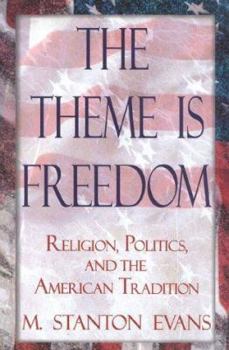The Theme Is Freedom: Religion, Politics, and the American Traditions
Select Format
Select Condition 
Book Overview
Author M. Stanton Evans challenges nearly every concept you've learned in history classes from elementary school to college: that our liberties stem from secular doctrines, that religious absolutes... This description may be from another edition of this product.
Format:Hardcover
Language:English
ISBN:0895264978
ISBN13:9780895264978
Release Date:January 1994
Publisher:Regnery Publishing
Length:366 Pages
Weight:1.61 lbs.
Dimensions:1.4" x 6.4" x 9.3"
Customer Reviews
5 ratings
Insightful
Published by Thriftbooks.com User , 23 years ago
I was assigned this book to read for a master's class several years ago, and how glad I was for it. Evans thoroughly backs up his arguments -- and in my view, his most compelling stance is that the American Revolution was actually a *conservative* one, directly challenging modern "conventional wisdom." How so? In a nutshell, he says that by desiring to uphold decades and centuries of established legal foundations, the Founders were at odds with an England (Parliament) that was more and more acting without lawful permission. A must read for those interested in *true* liberalism ("classic" liberalism), not contemporary liberalism.
One of the 25 most important conservative books
Published by Thriftbooks.com User , 24 years ago
Evans has written many successful books, but this is a stunning, path-breaking work. It is a frontal assault on Karl Marx and the economic determinism that underpins Marxism. In place of economic determinism, Evans offers what might be called theological determinism. He demonstrates that free countries are free largely because of religion, rather than despite religion, as liberals claim.
Evans combines great thinking with thorough research
Published by Thriftbooks.com User , 26 years ago
Stanton is one to the few authors that dares to question and rethink widely accepted assumptions on the roots of (America's) liberal tradition. Great thinking and interesting reading. A recommendation for everyone who values freedom and its Christian roots
integration of traditionalist, libertarian & religious
Published by Thriftbooks.com User , 26 years ago
The Kirkus Reviews review is insulting to our intelligence. Our we supposed to be scared away because "women, minorities... liberals" will be insulted? Of course, what they really mean is that Evans has not re-written history for the sake of making everyone feel included... Which is the standard of scholarship these days evidently. But for those who are interested in learning rather than getting a politically correct mind enema, this is an excellent book. Evans builds on the work of some of the most serious thinkers who have grappled with the Western liberal (libertarian) tradition: Burke, Tocqueville, Acton, Hayek & so forth. His thesis builds on all these great minds to present an integrated view of the role of tradition, liberty & religion in limiting state power & producing the regime of individual liberty that we all value so much. His chapter on "The Uses of Tradition" is particularly brilliant on the role of the common law. The excellent biblographical essay at the end is worth the price of the book alone. I'm sure many will disagree with the bold claims that Evans makes. But no intellectually honest reader will be able to lightly dismiss the book. This is serious, courageous scholarship that, yet, takes many perspectives into account, (if only to thoughtfully disagree with them). It deserves more substantive responses than Kirkus' warning to the faithful.
Traces our founding principles back to the middle ages.
Published by Thriftbooks.com User , 26 years ago
This book challenges the idea that the principles this country was founded on were derived from the Enlightenment philosophers. Evans describes the evolution of concepts like the rule of law, property rights and limits on the power of kings, and traces them back to medieval England even before Magna Carta and demonstrates that these ideas had been very thoroughly discussed, argued and implemented for centuries in England before the first colonies were formed, and written compacts and constitutions of the early colonies reflect this.Evans convincingly argues that Christianity provided the fertile ground in which these ideas were able to take root and prosper, and provides plenty of quotes and footnotes to back it up. He also makes the point that Christian Europe was the only place in the history of the world where these ideas DID take root, and that even today, freedom is a fairly rare commodity elsewhere in the world.It is his contention that the idea that all men are created equal was introduced to the world by Christianity, and that it was Christianity that gave feudal nobles the authority to challenge the power of kings.I'm not a religious person, but am beginning to realize that I had a whole bunch of misguided preconceptions about what the Christian religion is and is not responsible for, and will never swallow the politically correct line again without a healthy dose of skepticism.I recommend this book to anyone interested in the history of the individual liberties our constitution was intended to ensure.





